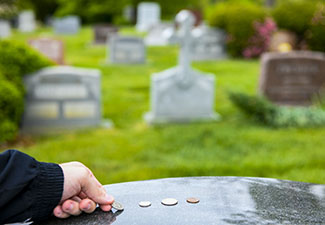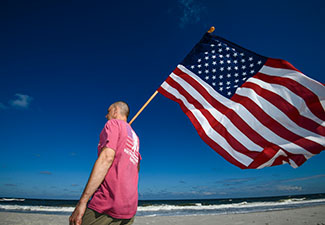What is Memorial Day? Facts, Meaning, and History

| Table of Contents |
| The History of Memorial Day |
| What Memorial Day Means to Those Who Serve |
| FAQ: Remembering and Honoring Memorial Day |
Some recognize Memorial Day by the seemingly endless commercials for car sales. Some recognize it as a long weekend to gather with friends and family around the barbeque. But what is the meaning of Memorial Day and why do we recognize it?
Memorial Day is an American holiday on the last Monday of May. It honors fallen service members of the U.S. military. While most know Memorial Day is a day of remembrance, many don’t know its exact history, importance, or how to properly pay tribute.
Wounded Warrior Project® (WWP) is proud to honor and empower wounded warriors every day by supporting veterans' everchanging needs after service. “The greatest casualty is being forgotten,” said Wilton Williamson Jr., vice president of Connection at WWP. “We will never forget. Memorial Day is a time to remember and honor all of those who paid the ultimate sacrifice while serving this country.”
The History of Memorial Day
Americans began to recognize Memorial Day in 1868, and the country established it as a federal holiday in 1971. Originally known as “Decoration Day,” the holiday started with communities coming together to decorate the graves of those who died during service.
“Every generation, from the Civil War to both World Wars, Korea, and Vietnam, has had men who have either paid the ultimate sacrifice or have been injured. So, it's ingrained in our DNA to stand in the gap,” said National Guard veteran Bill Hansen. “To stand in the gap is to serve and support our country, and our family, even when others don’t."
After the Civil War, Americans across the nation began holding tributes in the spring, decorating graves with flowers, reciting prayers, and honoring the estimated 620,000 fallen soldiers of the war (2% of the population at the time). Some records show that formerly enslaved people in Charleston, South Carolina organized the earliest Memorial Day commemorations in 1865. In 1866, the federal government declared Waterloo, New York, the official birthplace of Memorial Day when the city closed all businesses so residents could decorate the gravesites of soldiers with flowers and American flags every year.
What Memorial Day Means to Those Who Serve
"Our debt to the heroic men and valiant women in the service of our country can never be repaid. They have earned our undying gratitude. America will never forget their sacrifices." — Harry S. Truman, 33rd U.S. President, 1945
While many celebrate the day outdoors alongside family and friends, others mourn the loss of their brothers and sisters in arms, paying tribute to their memory in any way they can.
“Memorial Day is important to me because I honor those who have sacrificed their lives and their family's lives in pursuit of freedom for our nation,” said Army veteran Edwin Martinez. “What greater gift can one man or woman sacrifice to keep the U.S. free and maintain our way of life?”
U.S. Marine Corps veteran, David Daly, also holds Memorial Day close to his heart. He recognizes that many look forward to the long weekend, but encourages us all to look beyond the day off and remember the bravery of the men and women who served.
“It has been said that one of the greatest tragedies is to be forgotten,” said David Daly. “As people take the opportunity afforded them by the long weekend associated with Memorial Day, it is important to remember why the day exists. For me, the day reminds me of friends lost and the horrors of war. At the same time, it reminds us all that while the day-to-day events of the world often paint a picture of gloom and doom, we still live in a place where heroes are among us. While these brave souls have passed in service, their memory is honored on Memorial Day to remind us that we had the privilege of existing on the same plane as them, even if it was only for a moment.”
FAQs: Remember and Honor Memorial Day
“Every year growing up, we would go and put flowers or wreaths on the gravesites of our family members. It's been ingrained that their names cannot be forgotten,” National Guard veteran Bill Hansen said.
“Since my move to Texas, I have brought my family to help remember other people's names and their sacrifice,” Bill added. “The other thing that we do is the ‘Murph’ workout every year. It's a physical representation of sacrifice. While most people don't truly understand, it's a chance to appreciate how military families sacrifice.”
When is Memorial Day?
Memorial Day is observed on the last Monday of May each year in the United States. In 2025, Memorial Day will be observed on Monday, May 26.
Upcoming Memorial Day dates:
- 2025: Monday, May 26
- 2026: Monday, May 25
- 2027: Monday, May 31
- 2028: Monday, May 28
What can I say instead of “Happy Memorial Day”?

On Memorial Day, it's important to remember we are honoring our fallen. For many, this day is not a happy occasion but a solemn one. Here is some guidance on the appropriate messages to convey:
- Rather than “Happy Memorial Day,” say something like “Have a meaningful Memorial Day.”
- It’s also not appropriate to thank a service member for their service on this day, as it is a day for remembering and honoring those who made the ultimate sacrifice.
- Take a moment to recognize and remember. You can even say, “Today and always, I’m remembering [name].”
Remember to speak from the heart and with sincerity, acknowledging the significance of the day and the sacrifices made by those we honor.
What is the difference between Memorial Day and Veterans Day?
- Memorial Day honors the sacrifice and loss of those who served and died in the military.
- Veterans Day honors all who have served in the U.S. military.
Memorial Day is a reminder of the brave men and women who served our country and gave their lives for our freedom.
It's not just a day off; it's a time to think about why we remember these heroes. For veterans, it's a chance to honor those who are no longer here.
Use this day to show how grateful we are for their bravery, and as a promise that we'll always remember their courage and sacrifice.
Find out how you can support wounded veterans.
Contact: Kaitlyn McCue, Public Relations, kmccue@woundedwarriorproject.org, 904.870.1964
About Wounded Warrior Project
Since 2003, Wounded Warrior Project® (WWP) has been meeting the growing needs of warriors, their families, and caregivers — helping them achieve their highest ambition. Learn more about how the organization supports veterans.



